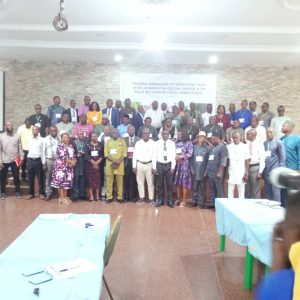FAO Supports Development of 7-year Strategic Plan for Cross River
Eme Offiong, Calabar
The United Nations Food and Agriculture Organisation (FAO) has trained stakeholders in the cocoa, coffee and oil palm value chains on development of a seven strategic plan for the Cross River State Government.

The training, which was held in Calabar, the capital of Cross River State, south-south Nigeria, focused on utilizing analytical data to develop a strategic plan which would enable the government drive production of the selected crops for improved revenue and food sufficiency.
In March 2024, the governor of Cross River State, Senator Bassey Otu inaugurated a multi-stakeholder committee to develop a 7-year Strategic Framework to optimize the three types of plantation crops to enable government earn more revenue.
The committee was also mandated “to design value chain policies for cocoa and oil palm that would encourage foreign direct investment, supports farmers and addresses market dynamics.”
According to the Commissioner for Agriculture and Irrigation Development, Mr. Johnson Ebokpo, “these mandated gave rise to the collaboration with FAO on capacity building for members of the multi-stakeholder committee of cocoa, coffee and oil palm. We are developing a seven year plan and so in developing this framework, we are breaking it into thematic areas.
“One of the areas is capacity building on strategic planning. There is the need to build the capacity of the members of the committee on how to develop a strategic plan looking at the variables such as stakeholder mappings to situational analysis, trending, and more. This underscores the resolve of this administration to do things differently,” he stated.
He further described the training as a demonstration of the collaboration between international donors such FAO, which is the lead development partner for this project.
SWOT analysis
Also, the chairperson of the multi-stakeholder committee, Professor Susan Ohen in a remark said that members had commenced the process of developing the framework in line with the mandate given at inauguration.
Professor Ohen stated, “the committee was at the stage of setting strategic goals and objectives, which is the reason for this training for stakeholders to know the SWOT (Strength, Weaknesses, Opportunities and the Threats) of those sectors.”
Continuing, Ohen explained, “for a crop like cocoa, we talk about the strength such as the land we have to cultivate; then the weaknesses of the market system, which are not developed. We also look into the opportunities, which is the enabling environment the government has created and we examine the threats. Climate change is a big threat to the cocoa production. We need to analyze these things in other to set strategic objectives.
“The outcome from this process will be a plan that has all stakeholders involved. By that I mean the farmers, the marketers, the processors, all that are involved in the chain; facilitating organisations like banks and then the state government. The plan is going to be such that the roles of each of these stakeholders would be clearly specified,” she added.

